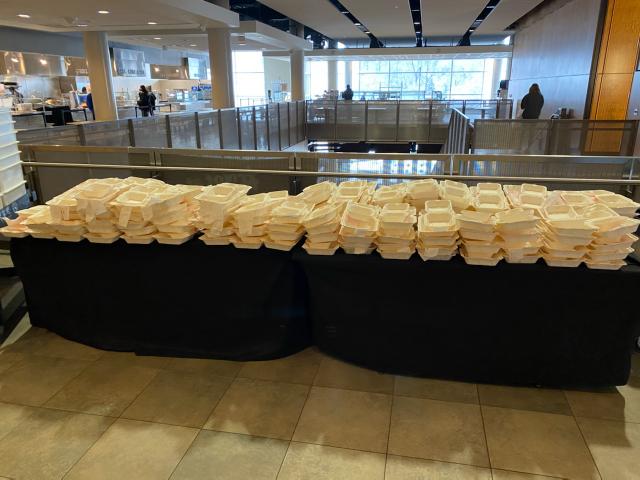
TU continues to prioritize climate commitments during the pandemic
By: Lillian McBee, Contributing Writer
Towson University (TU) remains committed to environmental sustainability during the COVID-19 pandemic by participating in the Campus Race to Zero Waste competition.
The Campus Race to Zero Waste is a competition spanning eight weeks in an effort to dispose of waste responsibly. This competition measures the amount of composted and recycled waste at colleges across the United States and Canada. Starting Feb. 14 through to March 27, this race encourages students to properly sort their waste.
According to the Office of Sustainability, the Campus Race to Zero Waste competition has three different ranking categories.
Ranking categories include:
- Food organics (total amount of compost generated on campus),
- Diversion rates (total reported weights of recyclables and food organics diverted from total waste generated) and,
- Per capita classic (only recyclable weights reported).
Organizations like Student Environmental Organization (SEO) and Eco-Reps work alongside the Office of Sustainability to promote an ecologically sound campus.
“As an Organization, SEO collaborates with the Office of Sustainability with events such as the Campus Race to Zero Waste, ” SEO President Thomas Potter stated.
According to their website, a few initiatives TU has taken include using RecyAll, which consists of 5,000 single-stream recycling bins on campus. These bins are easily accessible to students and provide information on how to appropriately dispose of waste after dining. With this single strategy, TU has recycled over 21 million pounds of waste in the past 10 years, the equivalent of taking 5,000 cars off of the road.
Along with this, the University continuously supports local farms. These farms are family-run and sustainable. In 2018, Towson purchased 26,850 pounds of local food and supported 40 farms.
According to the Office of Sustainability, TU has enforced environmental initiatives to support President Kim Schatzel’s Climate Commitment.
With limits in place due to COVID-19, TU has turned to take-out dining options for the students residing on-campus. They offer compostable materials for containers, bags, utensils, and napkins. These efforts promote safer dining to the students while remaining compliant with TU’s sustainability initiatives. However, these materials are single-use.

“Landfill waste will exist on our planet for hundreds of years, and burning trash contributes to local air pollution,” the Office of Sustainability’s website reads. “There’s a better option. You can lessen your impact and divert waste by reducing, reusing, and recycling on TU’s campus.”
Potter asserted the importance of reusable products instead of single-use products.
“The goal of waste management is to have as little of it as possible,” said Potter. “Reduction is the first “R” for a reason. I would like the emphasis to be on reusable products like personal cutlery or returnable Tupperware. Having more single-use products by encouraging take out is not the greatest, but it is definitely better than nothing.” Potter expressed.
As of now, the campus is operating with limited capacity for residential spaces, housing only 2,300 students. Due to this, many students are now having to commute to campus. Potter feels that this will lead to an increase in greenhouse gas emissions.
“A significant portion of our greenhouse gas emissions comes from commuting students like myself,” said Potter. “In order to thrive in a more sustainable future, I believe the university needs to their part to reduce or offset these emissions.”
TU continues to promote the RecyAll initiative which promotes single-stream recycling on campus, which allows people to place all general recycling into one contained as long as it’s cleaned first and contains no liquid.
Alongside the Campus Race to Zero Waste competition, the Office of Sustainability is hosting a virtual Fix-It Fair: Food Waste Edition. Students have the opportunity to get creative with how to turn their food scraps into more meals.
For more information on TU’s sustainability or how to get involved in environmental initiatives, visit the Office of Sustainability website.
– The Towerlight reached out to the University for comment on how COVID-19 has impacted TU’s initiatives, but they did not respond in time for publication.
– Grace Coughlan, Associate Editor contributed to this article.

